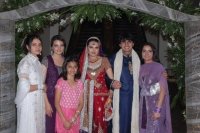From The Peopling of New York City
South Asian Men Respond to Female Employment
Walking through Jackson Heights, one notices that social differences are established between males and females. Whether it is as obvious as a woman walking a few paces behind her husband or as subtle as three women working the register at a sari shop under a male manager, the differences between gender exist in the business district. Walking down 37th Avenue, one will see women at the register at many business, including Sona Music, Nanking Restaurant and Akabir's Bakery. 37th Avenue Often, these women speak English poorly, many having recently immigrated to America. Although many woman work menial jobs, a few male shop owners have communicated the important of the working woman. In an Interview with Sunita petimar, Sunita, the male show owner “Shri Krishna Jewelers” on 74th Street says, “Nowadays in India, women have to work, just like they do in America. It used to be that women did not leave the home; they just cooked and cleaned, and so on. But now India is developing, especially in big cities like Bombay, and women have to work just like in America. My wife was always used to working.” Sunita’s daughter is currently going into Pharmacy and he encourages education and job choice freedom greatly, “We let them do whatever they desired. They could have gone into any field they wanted.” However, I do not thing the fact that Sunita’s daughter has gone into pharmacy (another health-related field) and his son, into engineering is a coincidence with the trend among many South Asians. This was most likely under the influence of the parents of the household. Regardless, family trends a pointing to equalizing South Asian men and women, especially in the second generation.
Sunita’s opinion, which beings to equalize men with women, is becoming more common in South Asian families. What one might not realize how gender discrepancies are changing, outside of the Jackson Heights model. Some dynamics still stand strong. Kanushree Jain, like many other South Asian women, followed her father in coming to America. Her father was suffering business losses and came here with his brother. Later on, Kanushree, her siblings, and her mother came here when he found work and an apartment in Flushing, Queens. Some women are not lucky enough to find husbands or fathers whom they could follow to the United States. “A highly-placed woman executive in South India, unmarried at 55, confessed with a grin that she had to have a guardian when she was transferred to an Indian city in which she had no relatives” (Lessinger 1995:110).
That being said, most men do not want their wives and daughters to be lacking in education. “My father wants me and my sister to get an education and rise up in the world,” says Kanushree Jain in Interview with Kanushree Jain. Many men, "particularly, the more sophisticated and professional, encourage their wives, become proud of their wives' careers and successes and even offer some help with housework and child care" (112). These men want their wives to be educated and to have a job because the wives become "far more interesting companions and [occupy] a more equal role in the family now that they [have] jobs" (112). This success through education does not differ from that of Suleman Ilyas' father in The Male Perspective: Suleman Ilyas. When asked about whether his sister would be expected to settle down and have children after she was married, Suleman replied: "No, my father would have still sent her to school. She may have been a doctor there. My dad really values education and she would go to school." Jeffin Mathew, in Interview with Jeffin Mathew, underscored this opinion once more when he said that, "More than anything, [my parents] want a complete education for us. That’s what most Indians want for their kids. They don’t care what we study, as long as we complete it and make something of ourselves."
Unfortunately for South Asian women, not all men are as progressive as the ones mentioned above. Some men allow their wives to work because the money they would bring to the table is very necessary, especially for new immigrants. However, as soon as the husband notices that the wife brings up certain ideas about feminism or equality that she gathered from conversation with other women, he might get very angry and force her to quit her job. A wife having a temporary job until the husband finds a steady form of income does not have to be a bad thing, however. Kanushree Jain said this of her mother's employment: "The mother would work if she had skills and she needed to but she doesn’t have to work if the father makes enough to support the family." It is a plain statement, without any sense of bitterness or scorn behind it. Suleman Ilyas, whose mother is in a similar situation to Kanushree's, even jokingly refers to his mother's occupation as "domestic engineer- housewife.” It is not something that is looked down upon, it is a fact of family life and it is a most necessary contribution to the family.

